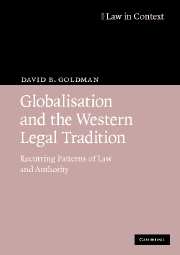Book contents
- Frontmatter
- Contents
- Preface
- 1 Introduction
- Part 1 Towards a Globalist Jurisprudence
- Part 2 A Holy Roman Empire
- 4 The original European community
- 5 Universal law and the Papal Revolution
- Part 3 State Formation and Reformation
- Part 4 A Wholly Mammon Empire?
- Part 5 Competing Jurisdictions Case Studies
- Bibliography
- Index
5 - Universal law and the Papal Revolution
Published online by Cambridge University Press: 30 March 2010
- Frontmatter
- Contents
- Preface
- 1 Introduction
- Part 1 Towards a Globalist Jurisprudence
- Part 2 A Holy Roman Empire
- 4 The original European community
- 5 Universal law and the Papal Revolution
- Part 3 State Formation and Reformation
- Part 4 A Wholly Mammon Empire?
- Part 5 Competing Jurisdictions Case Studies
- Bibliography
- Index
Summary
All authority in medieval Christendom was thought to derive ultimately from God … It might therefore seem fanciful to contemplate a return to the medieval model, but it is not fanciful to imagine that there might develop a modern and secular counterpart of it that embodies its central characteristics: a system of overlapping authority and multiple loyalty.
Hedley BullFor the advancement of a general, globalist jurisprudence, the legal achievement of the Papal Revolution is pre-eminent. The Papal Revolution instituted a mode of law with the possibility for universal application yet subjective allegiance across diverse jurisdictions in Western Europe. That we might there discover the key to a globalist jurisprudence so rusted yet capable of opening new doors may not be surprising. ‘[I]n no other age, since the classical days of Roman law, has so large a part of the sum total of intellectual endeavour been devoted to jurisprudence.’
Grand in scale, the new mode of law was conceived to coexist with other legal systems, in the context of a legal vision for world redemption. That is not to say that the everyday reality of canon and civil law met these ideals. Western legal science nonetheless evolved with that encoded facility. The crucial ‘ultimate reality and meaning’ which legitimated this social system was the Judeo-Christian God. Miracles and holiness demonstrated by leaders back then occupied a similar status to politicians today justifying their worthiness by delivering economic prosperity, highlighting the nature of the two millennial authorities.
- Type
- Chapter
- Information
- Globalisation and the Western Legal TraditionRecurring Patterns of Law and Authority, pp. 95 - 112Publisher: Cambridge University PressPrint publication year: 2008

